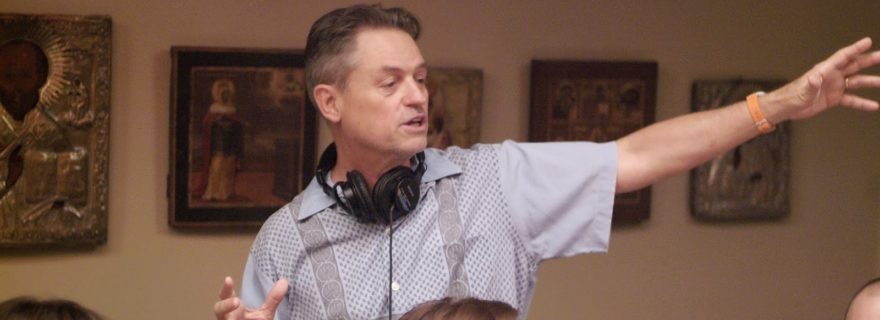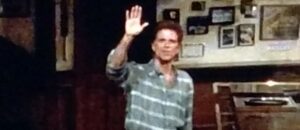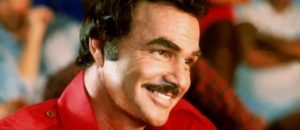The world makes a little less sense this week. Oscar-winning filmmaker Jonathan Demme has died at the age of 73.
Like a number of his contemporaries including Francis Coppola, Martin Scorsese and James Cameron, Demme got his start in show business working for the Roger Corman B-movie factory. His earliest directorial efforts had titles like ‘Caged Heat’ and ‘Crazy Mama’. After graduating from that on-the-job film training, he scored critical attention for the 1980 drama ‘Melvin and Howard’, which told the very odd story of a gas station attendant who claimed to have befriended reclusive billionaire Howard Hughes in his final days. The film won Oscars for supporting actress Mary Steenburgen and screenwriter Bo Goldman, and made Demme a bankable director.
Through the rest of the 1980s, Demme established himself as an eclectic talent, making the quirky comedies ‘Something Wild‘ and ‘Married to the Mob‘, the Talking Heads concert documentary ‘Stop Making Sense‘, and the Spalding Gray monologue film ‘Swimming to Cambodia’. Of course, his biggest critical and financial success came with the 1991 serial killer thriller ‘The Silence of the Lambs‘, which was a huge blockbuster hit and swept up five Oscars, including Best Picture and a Best Director trophy for Demme. It also launched a cinema icon with Anthony Hopkins’ portrayal of psychotic psychiatrist Hannibal “The Cannibal” Lecter.
For all that, ‘Lambs’ felt like an uncharacteristically commercial project for a filmmaker who, in most of his other movies, seemed to enjoy working small and doing his own thing. I have a feeling that he approached the script as a character drama and psychological study first, and may have even been surprised by the scope of its popularity. Nevertheless, it made him an A-Lister and opened a lot of doors for his career.
Suddenly an Oscar winner, Demme was now expected to make Oscar films, but he tried to avoid blatant awards-baiting as much as possible. The courtroom drama ‘Philadelphia’ was another big box office hit and indeed won Tom Hanks a second gold trophy, but it plays as a nuanced character piece with the potential melodrama and histrionics largely dialed down. When Oprah Winfrey tapped him to helm an adaptation of the Toni Morrison novel ‘Beloved’ as a star vehicle for herself, Demme frankly seemed like the wrong man for the job. The film was a box office failure and one of the director’s weakest efforts, but it’s interesting to compare his character-focused approach to the material to, for example, the much more ostentatious directorial fireworks that Steven Spielberg smothered ‘The Color Purple’ with.
That lack of pretention marked most of Demme’s career. His films had a distinctive voice and personality, but he wasn’t a flashy director who enjoyed showing off his technique. He believed in letting the material speak for itself. ‘Stop Making Sense’ is widely regarded as one of the best concert films ever made (if not the best), and that’s largely due to Demme allowing the band’s music and elaborate stage production do the work while his cameras stood back to get a clear view of it. His camera placement is precise and his sense of editing rhythm is flawless, but neither ever calls attention to itself. The movie doesn’t need any crazy angles or swooping crane shots over the stage, so he didn’t bother with them.
Even ‘The Silence of the Lambs’ is extremely restrained for a movie of its type. Demme builds a sense of unnerving dread by focusing on the mundane details of the investigation. He gets more tension from simply placing a couple of powerhouse actors in a room to talk to each other than any of the overwrought flourishes Ridley Scott brought to the poor sequel, ‘Hannibal’, ever managed.
In terms of career expectations, Demme never topped (or even duplicated) the success of ‘Lambs’ and ‘Philadelphia’. After ‘Beloved’, he had a couple more box office disappointments with the perhaps misguided remakes of ‘Charade’ (called ‘The Truth About Charlie’) and ‘The Manchurian Candidate‘. Whether he was ostracized from the big Hollywood studios at that point or simply didn’t want to make that type of movie anymore, his later years mostly focused on concert films (making three for his friend Neil Young) and documentaries, with the occasional indie project such as ‘Rachel Getting Married‘ and ‘Ricki and the Flash‘.
The filmmaker’s death on Wednesday was reportedly the result of esophageal cancer and complications from heart disease.
[Source: IndieWire]






Julian
He also directed three Springsteen clips, of which ‘Streets of Philadelphia’ is the most remarkable one. 99% of all video clips use prerecorded music and vocals (and as such, the musicians are miming instead of singing), but Springsteen and Demme thought said use would be tacky for a sensitive song about the AIDS-disease. So Demme hid a small microphone under Springsteen’s vest, and Springsteen sang the song as he walked. A very low-key, intimate video clip that lacks the visual flair of many of its contemporary rivals, but all the better for it. The end result is pure class, one of the best clips of all time.
Timcharger
Springsteen AND Neil Young on that Philadelphia soundtrack. Every year I waver as to which song I like better. Good debate in my mind. Thanks to Demme for bringing that talent together for the film. R.I.P.